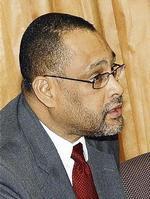
Latibeaudiere
Central bank governor Derick Latibeaudiere said Wednesday he expected no major disruptions in the foreign exchange market, despite the pressures last month that clipped half a point off the value of the Jamaican dollar against the United States dollar.
The local currency traded Wednesday at J$67.67 for one greenback, a 10 cent appreciation over the past fortnight.
"Against the background of positive fundamentals, we have no reason to believe that the recent bout of instability in the foreign exchange market in January will result in any major disequilibrium in the market," said Latibeau-diere at his monthly briefing of reporters and analysts.
Latibeaudiere's optimism for the foreign exchange market came on the back of generally good news for the economy, the Planning Institute of Jamaica estimating a 2.7 real growth in GDP in the October-December quarter and projecting further growth of 2.9 per cent between January and March.
Preemptive action
But the current stability in the FX market did not come cheaply for the central bank, which regularly intervened in January and February, using its reserves to help shore-up the Jamaican currency. And Latibeaudiere warned that such interventions could happen again, saying that the central bank was prepared to act "pre-emptively where necessary".
January's foreign exchange pressures were mainly due to portfolio switching, driven by limited domestic assets and some dealers attempting to cover short positions. There was also exceptional demand from the energy sector to meet high oil bills.
Bouts of instability
But Latibeaudiere said the central bank now expects the money and foreign exchange markets will remain fairly stable, given the expected robust flows from tourism and other exports and a decline in demand for import payments.
The central bank also projects lower demand for funds for Jamaicans travelling abroad, lower outward remittances, as well as strong private sector inflows due by the end of the quarter.
Latibeaudiere described the foreign exchange rate as "fairly stable" in the October to December 2006 quarter, but admitted that October and November had also seen some "bouts of instability".
The BoJ Quarterly Monetary Policy Report for the period argued that this was a result of a decline in net private capital inflows of US$337 million, largely due to an increase in the net foreign currency position of the authorised dealers whose net sales to the market fell by U$176.7 million.
According to the report, this build-up in dealer's foreign positions reflected portfolio adjustments, particularly to do with secondary market sales of the Clarendon Alumina Production Limited (CAP) bond, settled November 16, as well as a general increase in market demand for foreign exchange.
The BoJ governor was emphatic that the forex market's performance did not reflect "hoarding but people expressing a portfolio choice".
Future cuts
This was not capital flight for the money remained in Jamaica, but investors "exercising their right to hold funds in foreign currency".
He said, however, that the behaviour could not be explained against the attractive interest rates on Jamaican-dollar denominated instruments compared with U.S. assets.
Responding to a question as to whether the 12 per cent rate on 180 day BoJ repos represented a "psychological barrier" to further cuts in domestic interest rates, the BoJ boss suggested that future cuts were possible, and would take place, in the proper environment.
"Jamaica needs to continue on the path of interest rate reduction," he said, but stressed that it would be "clearly foolhardy to reduce interest rates if the foreign exchange rate was unstable".
keithcollister@cwjamaica.com

